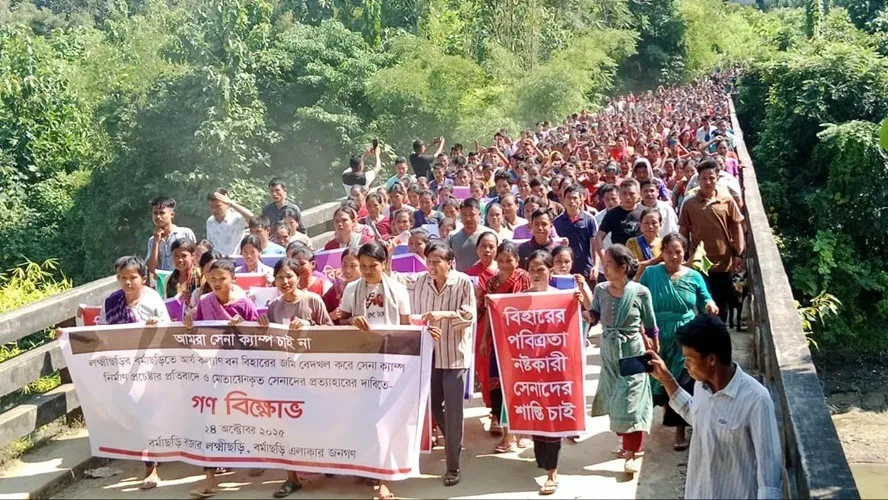The Rights and Risks Analysis Group (RRAG), a Delhi-based human rights watchdog, on Tuesday condemned Bangladesh’s Chief Advisor Muhammad Yunus for allegedly allowing radical Islamist groups, the army, and the judiciary to target religious minorities across the country.
In a strongly worded statement, RRAG Director Suhas Chakma accused the interim government led by Yunus of “fostering an environment of impunity and religious persecution” through its support for extremist organisations and misuse of legal mechanisms.
Protests against ISKCON backed by Islamist groups
According to Chakma, on October 23, several Islamist groups — reportedly backed by Yunus’ interim administration — held coordinated demonstrations across Bangladesh, calling for a nationwide ban on the International Society for Krishna Consciousness (ISKCON).
During one such rally in Dhaka, students were heard shouting inflammatory slogans, branding ISKCON members as “Indian agents” and demanding their detention and expulsion. The Hefazat-e-Islam Bangladesh later issued a statement echoing these accusations and urging authorities to impose a formal ban on the organization.
Similar demonstrations took place at the Baitul Mukarram National Mosque and Sher-e-Bangla Agricultural University, raising concerns about state tolerance of extremist rhetoric.
Chakma said that Jashimuddin Rahmani, the former leader of the al-Qaeda–linked Ansarullah Bangla Team (ABT) — convicted for the 2013 murder of blogger Rajib Haider and other terror-related offences — was seen participating in the Baitul Mukarram protest.
“Rahmani’s re-emergence in extremist rallies underscores the support of Yunus’ government for radical Islamist elements,” Chakma said.
Army accused of land grab and violence
RRAG also alleged that on October 24, the Bangladesh Army attempted to forcibly occupy land belonging to the Arjya Kirti Buddhist Temple in Bormachari, Khagrachhari district, to establish a temporary military camp.
This alleged incident followed the killing of three youths on September 28, when the army opened fire during a protest demanding justice for a 14-year-old indigenous girl who was reportedly gang-raped by three Muslim settlers.
Chakma claimed the episode reflects a “deepening culture of impunity” surrounding violence against indigenous and minority women, citing previous cases such as the gang-rape and murder of Chingma Khiyang (29) in Thanchi, Bandarban, and the assault of a Tripuri Hindu schoolgirl in Khagrachhari.
Judicial bias and cyber law misuse
Highlighting the alleged misuse of judicial and cyber laws against minorities, Chakma pointed to the case of Sreeshant Roy, a student of the Bangladesh University of Engineering and Technology (BUET), who was suspended on October 21 for “hurting religious sentiments” through his Reddit posts.
Roy was arrested the next day under the Cyber Security Ordinance, 2025, and subsequently jailed — a move RRAG described as “a stark example of the weaponisation of the justice system against minority voices.”
“Religious minorities have been facing systemic discrimination across Bangladesh,” Chakma said. “The latest incidents show that the state machinery — from the army to the courts — is being used to marginalize and terrorise non-Muslim communities.”
The RRAG urged international human rights bodies and the United Nations to take cognisance of the situation, warning that continued silence could embolden extremist forces and further erode religious freedom in Bangladesh.
Long or Short, get news the way you like. No ads. No redirections. Download Newspin and Stay Alert, The CSR Journal Mobile app, for fast, crisp, clean updates!
App Store – https://apps.apple.com/in/app/newspin/id6746449540
Google Play Store – https://play.google.com/store/apps/details?id=com.inventifweb.newspin&pcampaignid=web_share


